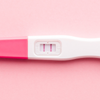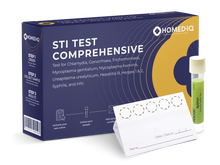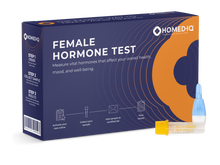Lauren is a health scientist and science communicator currently living in the Netherlands. Originally from Canada, she completed a Research Master’s in Health Sciences at the Netherlands Institute of Health Sciences at Erasmus University Rotterdam (NIHES) with a specialisation in epidemiology. Prior to her master’s degree, she completed a Bachelor’s degree in Health Sciences at Simon Fraser University. With a background in public health, her goal is to create accurate scientific content that is easy to understand and empowers people to make informed decisions. Within Homed-IQ, Lauren works as a Product Developer and Content Lead, working closely with physicians and scientists on medical devices for Homed-IQ’s new products and written communications.
What can be mistaken for herpes?
When people think of herpes, they often think of cold sores or painful blisters. But did you know that herpes sometimes has no symptoms at all, or symptoms that can be easily confused with other conditions? Herpes is a very common virus- it is estimated 67% of the world’s population has herpes simplex virus 1 (HSV-1), and 13% of the population has herpes simplex virus 2 (HSV-2) (WHO, 2022). However, the majority of the people in both groups do not have symptoms, and many of them do not know they have herpes.
Why is it so hard to tell if you have herpes? Apart from those that don’t experience symptoms at all, herpes symptoms can present themselves in a variety of ways, causing symptoms such as pain, itching, or bumps on the genitals or mouth region. These symptoms can seem like other STIs or skin conditions. Are you experiencing symptoms you think could be herpes? Learn the common conditions that can be mistaken for herpes, and how to know for sure whether you are infected or not.
Table of Contents
- What conditions can be mistaken for oral herpes?
- What conditions can be mistaken for genital herpes?
- How do I know if I have herpes or not?
- Are herpes test results accurate?
What conditions can be mistaken for oral herpes?
Oral herpes (HSV-1) can cause symptoms that can resemble several other conditions, which can make it difficult to know if you have the infection or not. An oral herpes infection often causes cold sores- small blisters that appear in and around the mouth. While these blisters can be painful, some cases are very mild and can be difficult to identify. Acne, contact dermatitis, canker sores, chapped lips, an insect bite, and an injury to the skin around the mouth are all harmless skin issues that can resemble cold sores. These conditions can cause bumps, redness, or abrasions to the mouth area, but often not the painful, fluid-filled blisters caused by a cold sore.
A recent syphilis infection can also cause a lesion in or around the mouth that can resemble herpes, also known as a chancre. Unlike herpes, this lesion is usually painless and can be treated with antibiotics. Would you like to rule out STIs as the cause of your symptoms? Homed-IQ’s STI Test Comprehensive checks for the most common STIs, including herpes, syphilis, gonorrhoea, and HIV.
While cold sores can resemble other skin blemishes, they tend to look like translucent blisters rather than solid bumps on the skin. Look for the following signs to help identify a herpes infection.
- A feeling of tingling, burning, or itching in the affected area
- Blisters filled with clear fluid
- Pain and redness around the sores
- Crust over and dry out as they heal
Source: NHS, 2020
What conditions can be mistaken for genital herpes?
Genital herpes is caused by HSV-1 or HSV-2 and can cause outbreaks of blisters on the genitals or thighs. Genital herpes is more difficult to identify than oral herpes because blisters can be hard to see, and symptoms may be mild and not occur often. Additionally, symptoms of genital herpes are similar to several other conditions affecting the genitals, such as bumps on the skin, a feeling of burning or itching, trouble urinating, and/or abnormal discharge (Johns Hopkins Medicine, 2022). Conditions that may be mistaken for genital herpes are ingrown hairs, pimples, haemorrhoids, insect bites, bacterial vaginosis, yeast infections, and STIs like syphilis, chlamydia, and genital warts. Symptoms can also differ between men and women. As symptoms can be difficult to identify and blisters can be hard to spot, the best way to check if you have a genital herpes infection is by seeing a healthcare professional. A doctor or nurse can check for blisters and/or perform a test, which includes either a swab of the blisters or a blood test. If you would like to check for herpes without going to the doctor, home tests such as what Homed-IQ has on offer allow you to perform a blood test for herpes equal to what you would perform at a clinic from the comfort of home.
How do I know if I have herpes or not?
The only way to know for sure if you have herpes is to perform a home test or visit a healthcare provider for an examination. If you have symptoms, herpes can be diagnosed through looking at or swabbing the sores. If you don’t have symptoms or any visible blisters, a blood test will be performed (CDC, 2022). This can be done either with a home test or by a healthcare provider. An advantage of a test for herpes is that you can learn whether you have HSV-1 or HSV-2, and the chance of misdiagnosis is lower than from a visual examination.
Are herpes test results accurate?
A false-positive is a test result that says a person has a certain condition when in reality, they don’t. False-positives are a possibility for almost all medical tests, including STI tests. While blood tests for herpes are accurate and reliable, there is always a chance of a false positive test result. Since herpes is a lifelong infection and a false-positive test result can cause an individual stress or anxiety, it is important to minimise false-positive test results. Using high quality, accredited tests and laboratories is one way to limit the chance of a false-positive result. All of Homed-IQ’s STI tests are validated for home use and processed in the same laboratories that GPs, hospitals,and clinics use for their test samples.
A false-negative is a test result that says a person does not have a certain condition when in reality, they do. Testing too early after being infected can cause a false-negative test result. It can take as little as three weeks, but up to four months after infection for a herpes blood test to be positive (CDC, 2022).









